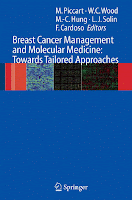Why should you buy another book on breast cancer? Did not you already have enough books for breast cancer on your shelf? The editors have tried to create a different type of breast cancer book. Although the typical breast cancer book is written as a compendium of diagnoses and treatments, the focus of this book is about the present and future of breast cancer research and treatment, with emphasis on translational research.
The breast cancer treatment is moving increasingly towards laboratory based, targeted therapies that are tailored to each patient. The treatment of breast cancer, and probably all cancers, it is likely that this practice will soon be radically different. The tsunami wave laboratory and translational research is already underway soon change the management of breast cancer in a fundamental way, and indeed, is already influencing the way we think about treating breast cancer patients and conducting research.
 The clinical research laboratory and translational aspects of breast cancer has greatly improved our ability to treat and cure patients with this disease. Population data (eg the U.S. and the UK) a document of substantial decline in mortality from breast cancer in the last decade, despite the increased incidence of breast cancer detection, which shows the benefit in human terms, from this research. The authors believe that this downward trend in mortality is only the beginning.
The clinical research laboratory and translational aspects of breast cancer has greatly improved our ability to treat and cure patients with this disease. Population data (eg the U.S. and the UK) a document of substantial decline in mortality from breast cancer in the last decade, despite the increased incidence of breast cancer detection, which shows the benefit in human terms, from this research. The authors believe that this downward trend in mortality is only the beginning.
What makes this book unique is that it considers a wide range of important and exciting areas of clinical research, translational, and basic to their current clinical application possibilities and to transform the future treatment of breast cancer. If history is any guide scientific discovery, then some but not all of these areas of research valuable to patient care, and the rest will fall by the wayside. But today nobody can predict which of these research areas have the greatest impact on the treatment of patients in the coming years.
The breast cancer treatment is moving increasingly towards laboratory based, targeted therapies that are tailored to each patient. The treatment of breast cancer, and probably all cancers, it is likely that this practice will soon be radically different. The tsunami wave laboratory and translational research is already underway soon change the management of breast cancer in a fundamental way, and indeed, is already influencing the way we think about treating breast cancer patients and conducting research.
 The clinical research laboratory and translational aspects of breast cancer has greatly improved our ability to treat and cure patients with this disease. Population data (eg the U.S. and the UK) a document of substantial decline in mortality from breast cancer in the last decade, despite the increased incidence of breast cancer detection, which shows the benefit in human terms, from this research. The authors believe that this downward trend in mortality is only the beginning.
The clinical research laboratory and translational aspects of breast cancer has greatly improved our ability to treat and cure patients with this disease. Population data (eg the U.S. and the UK) a document of substantial decline in mortality from breast cancer in the last decade, despite the increased incidence of breast cancer detection, which shows the benefit in human terms, from this research. The authors believe that this downward trend in mortality is only the beginning. What makes this book unique is that it considers a wide range of important and exciting areas of clinical research, translational, and basic to their current clinical application possibilities and to transform the future treatment of breast cancer. If history is any guide scientific discovery, then some but not all of these areas of research valuable to patient care, and the rest will fall by the wayside. But today nobody can predict which of these research areas have the greatest impact on the treatment of patients in the coming years.


